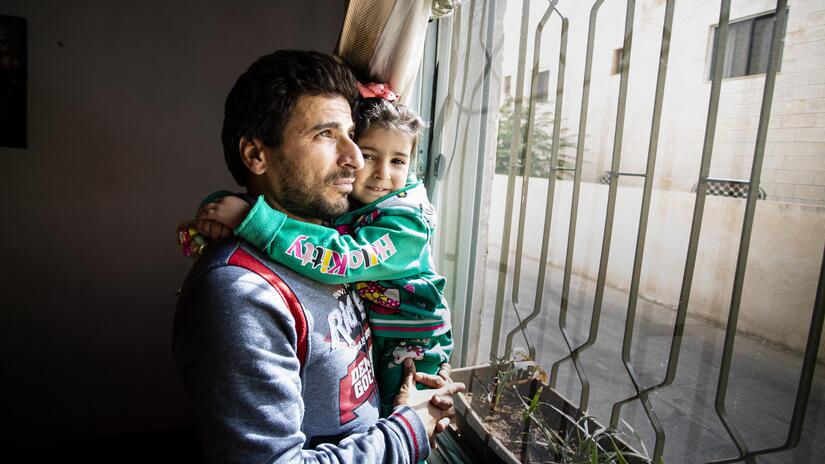A decade ago it seemed like a dream could come true for Nafe Ahmad Khalifah from Syria. For two years he had worked long days making pastry in Thailand, hoping to one day have his own little bakery and house. In 2009, he finally returned home with enough savings to start building.
“I came back to Syria with a small amount of money and a big dream to live there with my family for the rest of my days. I never thought I would have to leave again”, Nafe Ahmad Khalifah says.
As Mr. Khalifah started to build his house and his business, the Syria crisis began. At first, he was not worried, just thought that it will be over in a few days. As those days turned into weeks and into months and finally into years, and there was no end at sight, fear took over him and his family.
“One night, my firstborn daughter got so scared by the sounds of shooting nearby that all night she held onto me very tightly, refusing to let go. I still remember how desperate I felt when I realized that we have to leave.”
The beginning of the year 2013 was very dark for the family: their house was destroyed in the conflict. The family fled to Jordan, where they were first taken to Zaatari refugee camp. It’s still difficult for Nafe Ahmad Khalifah to even talk about this time.
“I was not even really living, just trying to survive and keep my family alive. This was the darkest period of my life.”
After a few months the family was able to leave the camp and to live with some other Syrians in Amman. However, the conditions remained difficult.
“We lived in very crowded places without privacy, our own space or windows, without enough warmth or light. We had small kids. I had no job and could not provide for my family. We only got by because of support from organisations, friends and relatives”, Mr. Khalifah explains.
Formerly a baker by profession, Mr. Khalifah was hoping to find work in Jordan.
“Preferably to have something to do with my hands, but I would have taken any job to support my family and make a living.”
He had been cutting his friends’ hair to pass time, and got interested in becoming a barber, but all the courses were too expensive for him. Then one day he found an ad in Facebook about a free barbering course through the Jordan Red Crescent, supported by the IFRC and funded by the European Union Regional Trust Fund in Response to the Syrian Crisis, also known as the EU MADAD fund.
Now Nafe Ahmad Khalifah is a proud graduate of that barbering course, and much more hopeful for the future than before.
“Not only was this course like wonderful gift, and I hope that eventually I can make my living out of barbering, but I’m also very grateful for all the support I got from the Jordanian Red Crescent. They were the first ones in years that really listened to me, that made me feel like I exist again – that I am human”, Mr. Khalifah says.
Together with his four children and his wife, Mr. Khalifah has quite recently moved to a small storage room inside of a parking hall in a residential building in Amman. As long as he cleans the garage and washes the cars of the residents, they are allowed to stay.
“It’s not ideal, because I need to find time to also start practicing my barber skills and look for a job in a salon. But at least now my family has a roof over their heads, we have this tiny space for ourselves, and there is a window from which we see the sun. Finally, after many years of darkness, I’m hopeful and I can see some light."
Photo and words by Mirva Helenius / IFRC
Article
Resilience: Nurturing new life in Galoolay village
Resilience: Nurturing new life in Galoolay village
| Article

